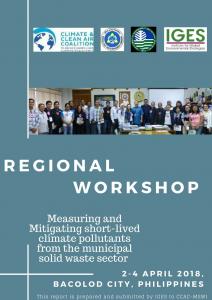Carbon dioxide (CO2), a primary driver of climate change, is responsible for more than half of the total current warming impact of human-caused emissions. Emitted CO2 remains in the atmosphere for hundreds of years, absorbing heat that contributes to a warming effect even after initial CO2 concentrations start falling. Taking this into consideration, mitigation efforts solely focused on CO2 will not be effective for slowing climate change in the near term, and need to be complemented by other measures addressing other potent greenhouse gases (GHG). It is therefore crucial that mitigation strategies also focus on the reduction of short-lived climate pollutants (SLCPs), including methane (CH4), tropospheric ozone (O3) hydrofluorocarbons (HFCs), black carbon (BC), among others, which are responsible for as much as half of global warming not caused by CO2 and possess atmospheric lifetimes of less than 20 years.
Cities are on the front-line in reducing emissions from the solid waste sector. Municipal solid waste (MSW) landfills comprise the third largest source of global anthropogenic methane emissions, and open burning of garbage and incomplete combustion of fossil fuels from waste trucks emit black carbon and other air toxins as well as GHG.
National and sub-national authorities across the Asia-Pacific region face a number of challenges with reducing SLCP emissions from the MSW sector. These challenges include improper waste management (i.e., separation, collection, and treatment), open burning of bio-waste and increasing amounts of waste being inadequately disposed in open dumpsites.
In this context, the Climate and Clean Air Coalition (CCAC) established the Initiative “Mitigating Short-Lived Climate Pollutants from the Municipal Solid Waste Sector (MSW Initiative)”. The overarching goal of MSW Initiative is to foster partnerships, political will and technical capacity that directly support cities to take action on methane and black carbon reduction and management. One key aspect of this work is the provision of capacity building for national and local governments aimed at promoting the sharing of best practices, supporting strategic planning and encouraging city-to-city mentoring on effective measurement and mitigation of SLCPs.
IGES has been actively involved in the MSW Initiative since 2012, during which time it has engaged with a number of cities across the region with the provision of technical assistance and guidance on climate-friendly waste management practices and approaches. In addition to carrying out trainings towards the preparation of relevant action and work plans for reducing SLCPs, contributions have also included the development of an SLCP quantification tool designed to assist public authorities with conducting a rapid assessment of emissions, and inform improved decision making on the identification of alternative waste management options that will lead to the reduction of SLCP emissions.
Following these activities, IGES, in cooperation with the Philippine’s Department of Environment and Natural Resources (DENR) and National Solid Waste Management Commission (NSWMC), organized a regional workshop from 2-4 April 2018 focused on the use and operationalization of the SLCP quantification tool during the planning and implementation of the climate-friendly waste management work plans. This report documents the proceedings of the workshop, which was designed to raise awareness, facilitate dialogue and promote knowledge sharing on effective SLCP mitigation actions in the MSW sector, with a view towards fostering a network of engaged actors from across the Asia-Pacific region.
A total of nine cities from across the region (Thailand, Myanmar, Cambodia, Indonesia, and the Philippines), as well as one Philippines’ province, attended the workshop, which over the course of three days featured active participation from municipal governments, DENR, and IGES. Workshop discussion focused on understanding drivers of SLCP emissions generated by MSW, impacts, and effects of SLCPs, ways to calculate SLCP emissions potentials, and available strategies for mitigating SLCPs in the municipal waste sector in view of policy, technology and finance issues. A site visit was also conducted to observe good practices associated with MSW management and encourage the documentation of options for future SLCP mitigation in future city action plans.

